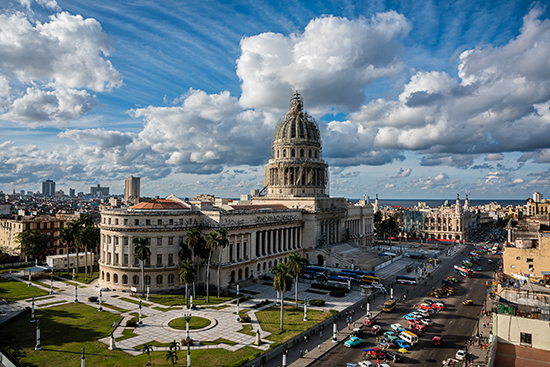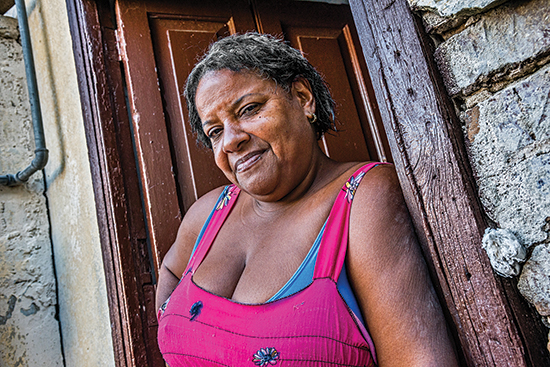Q. Thanks for speaking with us, David. How did you first connect with Cuba?
A. A conscious desire to go there arose in my mind sometime in the 1980s. In the 1970s, while living in New York, I stumbled across two important influences: one, a club on Avenue A in the East Village called New Rican Village where I was exposed to live Latin music. I would stagger home at 2 in the morning thinking, the percussionists deserve the Nobel Peace Prize because they are the true pioneers. And, two, I came across the album Irakere, a live recording by the Cuban jazz group of the same name, which was founded by Chucho Valdés. The seed planted in my mind by the music in the 1970s sprouted in the 1980s and bloomed in the 1990s when I saw an ad in Latin Beat magazine for a music and dance workshop in Havana taught by, among others, the very same Chucho Valdés. I was there in a heartbeat and life has never been the same.
Q. It seems like music and the arts inform so much of your Cuba-related photographic work. Talk about this.
A. In Cuba, music is like air and dance is like water. The two are inseparable and form an ever presence in Cuban culture and daily life. I was already a music devotee so I hit the ground running. The performing arts community in Havana is a small world, easy to enter, not at all pretentious like in the United States where every performer has a manager and a publicist. Also 1994 was the nadir of what was known in Cuba as The Special Period, the economic crisis brought on by the withdrawal of Soviet support. Anyone with something to offer, be it merely a kind word, much less a camera and an offer of collaboration, was readily welcomed. So there was an easy and organic symbiosis.
Q. In what ways has your Cuba experience shaped your evolution as a photographer?
A. Early in my journeys there, I experienced the breakup of a personal relationship I had with a Cuban woman. In my sadness and loneliness I turned to my work even more than before. I hit the streets shooting and found the world opening up in front of me. As my mind and eyes got their island legs it was just a matter of accumulating experience. The more you shoot the more you learn how to shoot. And that includes more than just operating a camera; it involves the act of observing, of seeing, of interpreting and. most importantly, of interacting with people. Learning Spanish was also a crucial component.
Q.Do you have a favorite photo in your exhibition? Tell us about it.
A. Well, I love all my babies so singling one out is kind of arbitrary. I'll go with the photo of a street vendor on whose cart are painted the American and Cuban flags and between them is written (in Spanish) "Neither with the devil nor with God." In second place is a mosaic of 600-ish faces forming the image of two hands on a drum. This image appears on the cover of Arturo O'Farrill and the Afro Latin Jazz Orchestra's new CD, Cuba: The Conversation Continues." Ask me tomorrow and I'll have a completely different answer.

Q. What do you make of the recent normalizing of relations between Cuba and the U.S.?
A. I think it is the most effective thing that Obama has done. It's a big deal but not a done deal. It has a lot to do with domestic politics and lame ducks on both sides with their own agendas. There will be winners and losers, opportunities and casualties. The next 18 months will be extraordinarily dynamic. Even a Republican president will not likely be able to reverse the changes that are coming. As much as they and the pro-embargo Cuban-Americans might want to, they have lost the advantage. They would have to take revenue away from business and farm states, destroying jobs in the process, and that isn't going to happen, no matter what they say now.
Q. What are three things you think every American should understand about Cuba, based on your own extensive experiences there?
A. To those who say, I want to see Cuba soon, before it changes, I say, too late. It has always been changing. Second, to those who think the coming changes mean Starbucks and McDonalds, I say, don't be so sure. The Cubans have one of the strongest cultures in the world. And they and their government are fiercely proud and protective of their sovereignty. If anyone is equipped to maintain their integrity and identity in the face of American capitalism and its incursions, it's the Cubans. Take a look at the Fabrica de Arte Cubano, the Cuban Art Factory, a new performance/exhibition space created by X Alfonso, formerly of the band Grupo Síntesis. Last, Cuba is a perpendicular universe to our own.






